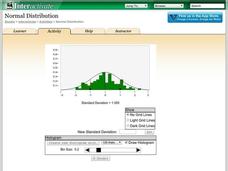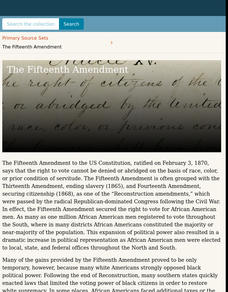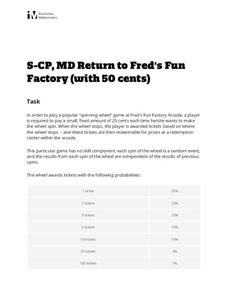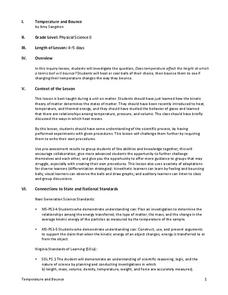Shodor Education Foundation
Rabbits and Wolves
A change in a parameter can end in overpopulation. The resources gives pupils the opportunity to control the parameters of rabbits and wolves in a natural setting. Using the set parameters, the simulation runs and displays the population...
Shodor Education Foundation
Normal Distribution
Does the size of the bin matter? The resource allows pupils to explore the relationship between the normal curve and histograms. Learners view histograms compared to a normal curve with a set standard deviation. Using the interactive,...
Concord Consortium
Square-Ness
Are there some rectangles that are more square than others? A thought-provoking task asks individuals to create a formula that objectifies the square-ness of a set of rectangles. They then use their formulas to rank a set of rectangles.
National WWII Museum
The War in Europe: Evaluating Historic Decisions
War brings a whole new set of ethical dilemmas. From deciding whether to enlist in a segregated and racist Army to whether to sacrifice civilian lives to prepare for a critical D-Day invasion, leaders during World War II faced many...
EngageNY
Grade 5 Math Module 1, Topic F, Lesson 13
After completing a fluency practice set on subtracting, multiplying, and comparing decimals, pupils begin learning about dividing decimals by whole numbers. They see how to use place value reasoning to find compatible numbers for...
Digital Public Library of America
The Fifteenth Amendment
Fifteen primary sources provide a context for a study of the Fifteenth Amendment to the United States Constitution. The packet captures the excitement for the changes promised by the amendment as well as the backlash against it.
Digital Public Library of America
Fannie Lou Hamer and the Civil Rights Movement in Rural Mississippi
Good primary resources, offering different perspectives on important issues and events, are hard to find. A packet of 12 primary source images, videos, audio recordings, records, and newspaper articles related to the 1960s civil rights...
Scholastic
Active Beginnings
Help your pupils build narratives and stories that capture the attention of their readers with this set of worksheets. The first focuses on active introductory sentences, the second on exciting transition words and phrases, and the third...
Q Continuum
Planets
Have you ever looked up at the night sky and wondered what constellation you were seeing or whether that bright object was a star or a planet? Are you searching for the best tilt-to-view constellation and planet app that money can't buy?...
BioEd Online
Butterflies in Space
How does gravity affect the life cycle of a butterfly? Learn first-hand what types of investigations astronauts perform in space by following along with one of NASA's experiments. Create butterfly habitats in the classroom with specific...
San Antonio Independent School District
Ancient Civilizations
Here is a fantastic set of graphic organizers to accompany your study of civilizations such as ancient Egypt, Sumer, Assyria, and Persia.
Illustrative Mathematics
Return to Fred's Fun Factory (with 50 Cents)
The penny arcade gets the statistics treatment in this fun probability investigation. A non-standard game of chance is described and then the class is set loose to find missing probabilities, determine common outcomes, and evaluate...
STEM for Teachers
Temperature and Bounce
Take part in a fun experiment and hold an impromptu bouncing contest with your class. Young scientists heat and cool balls before bouncing them to determine whether temperature changes affect how they bounce. The set of STEM lesson plans...
City University of New York
Electoral College
A presidential election is a lot like the 2004 World Series, and it's also a lot like choosing an orange in a paper bag. Apply the process of the electoral college to these two analogies with a set of lessons about government...
Cooking Matters
Cooking Matters: For Chefs and Kids
Get your scholars cooking with a collection of activities that pairs the class to a community chef, promotes healthy snacking and drinking, and explores fruits and vegetables. Lower elementary learners create vegetable super heroes,...
Charleston School District
Tables of Linear Functions
Don't forget the tables! The previous lessons in this five-part series examined the linear equation and graph relationship. The current lesson adds tables to the mix. At completion, individuals should be able to create a table of values,...
Regents Prep
Activity to Show Sample Population and Bias
There is bias in many aspects of our lives, and math is no exception! Learners explore provided data to understand the meaning of biased and random samples. The resource includes various data sets from the same population, and...
C-SPAN
Debates
How do the presidential debates of 2016 compare to the debates from the 1980's? What about the 1960's? Evaluate a chosen candidate or issue from the 20th and 21st centuries with a lesson plan focused on political debates. Middle and high...
EngageNY
Multiplying and Dividing Rational Expressions
Five out of four people have trouble with fractions! After comparing simplifying fractions to simplifying rational expressions, pupils use the same principles to multiply and divide rational expressions.
EngageNY
Sampling Variability in the Sample Proportion (part 1)
Increase your sample and increase your accuracy! Scholars complete an activity that compares sample size to variability in results. Learners realize that the greater the sample size, the smaller the range in the distribution of sample...
EngageNY
Margin of Error When Estimating a Population Mean (part 1)
We know that sample data varies — it's time to quantify that variability! After calculating a sample mean, pupils calculate the margin of error. They repeat the process with a greater number of sample means and compare the results.
WindWise Education
How Does a Windmill Work?
Can my windmill pick up a weight? Given the same set of materials, groups design and build the most efficient windmill. On the first day, groups concentrate on getting a windmill to spin, while on the second day, they modify their...
Teach Engineering
Measuring Surface Tension
How do you measure surface tension? The fifth installment of a nine-part series is an experiment where young scientists use tubes of different sizes to measure surface tension. They calculate the average and standard deviation of the...
University of Georgia
Heating and Cooling of Land Forms
Compare heating and cooling rates of different land forms. A lab activity has groups collect data on the rate of heating and cooling of soil, grass, saltwater, fresh water, and sand. An analysis of the rates shows how the different land...
Other popular searches
- Comparing Sets of Objects
- Comparing Sets of Coins
- Venn Diagrams Comparing Sets
- Comparing Sets of Money
- Comparing Sets of Data
- Nouns and Comparing Sets
- Comparing Two Sets of Data

























